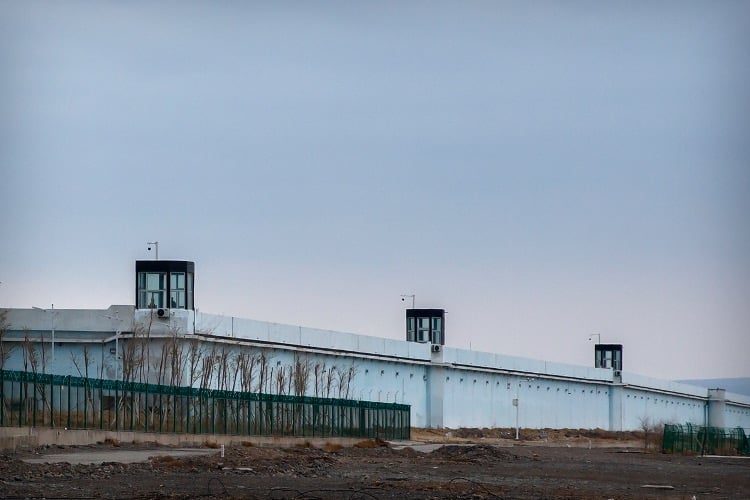
SINGAPORE — China committed “serious human rights abuses” — and potentially crimes against humanity — in the western province of Xinjiang, a top UN official announced, enhancing international pressure on Beijing over its actions toward Uyghur Muslims and other ethnic minority groups in the region.
UN High Commissioner for Human Rights Michelle Bachelet delivered her much-anticipated report on August 31, merely hours before the end of her tenure. Her 48-page report revealed “patterns of torture or other forms of cruel, inhuman or degrading treatment or punishment” as part of government efforts that Communist China has claimed are part of anti-terrorism efforts.
The UN report, which supported additional findings by human-rights groups on the communist state’s “serious” human-rights violations, called for “urgent” international attention to China’s widespread abuses. Some of these abuses included torture, mass incarceration, forced labor, and sexual assault. Additionally, the report called on China to release those detained.
Moreover, the document highlighted that these violations arose from China’s domestic “anti-terrorism law system” featuring ambiguous terms and concepts that violate international human rights norms.
The degree of China’s arbitrary detention of members of Uyghur and other predominantly Muslim groups was reflected by credible accusations of torture or ill-treatment, such as sexual violence and “violations of reproductive rights through the coercive enforcement of family planning policies.”
“The extent of arbitrary and discriminatory detention of members of Uyghur and other predominantly Muslim groups, pursuant to law and policy, in context of restrictions and deprivation more generally of fundamental rights enjoyed individually and collectively, may constitute international crimes, in particular crimes against humanity,” the report elaborated.
These “patterns of torture” supposedly took place inside the alleged “vocational training centers” that Beijing claims were set up to enhance economic development in the region.
Premised on interviews with previous detainees and others in the loop about the situations of eight detention centers in the Xinjiang region, the report implied that China was not always forthcoming with information. The report alleged that its requests for particular pieces of information “did not receive formal response.”
For many, Bachelet’s report will be seen as UN confirmation of the various allegations over China’s abuses that have long been asserted by human-rights groups, the Uyghur community in exile, and several Western nations.
Despite opposition from an increasingly pugilistic Beijing, Bachelet was determined to have the report completed and published.
“I said that I would publish it before my mandate ended and I have,” Bachelet said in an email sent to AFP.
“The issues are serious — and I raised them with high-level national and regional authorities in the country.”
China’s Response
In response to Bachelet’s report, China repudiated UN allegations of the communist state’s “crimes against humanity.”
Zhang Jun, China’s ambassador to the UN in New York, mentioned that Beijing had indicated that it was “firmly opposed” to the assessment.
“The so-called Xinjiang issue is a completely fabricated lie out of political motivations and its purpose is definitely to undermine China’s stability and to obstruct China’s development,” Zhang said.
Earlier on August 31, Chinese foreign ministry spokesman Zhao Lijian labeled the report as a “farce.”
“We firmly oppose the release of the so-called Xinjiang-related report by the UN Human Rights Office. This report is a farce orchestrated by the US and a small number of western powers,” he said.
“We hope that the high commissioner will make the right decision.”
Besides, the Chinese embassy to the UN in Geneva wrote that the document is based on “disinformation and fabricated lies by anti-China forces” and “wantonly defames and slanders China and interferes in China’s internal affairs.”
Bachelet, previously touted as being too lenient toward Beijing, responded, “Dialogue and trying to understand better does not mean that we are tolerant, that we look away or that we close our eyes.”
Other Responses
Japan was one of the first foreign governments to comment on the report, exhorting China to improve transparency and human-rights conditions in the Xinjiang region. Chief Cabinet Secretary Hirokazu Matsuno said, “Japan is highly concerned about human rights conditions in Xinjiang, and we believe that it is important that universal values such as freedom, basic human rights and rule of law are also guaranteed in China.”
In light of this report, Human Rights Watch and Amnesty International called on the UN and member governments to set up an independent investigation into human-rights abuses. Sophie Richardson, director of the Human Rights Watch for China, commented that this report “lays bare the massive violations of fundamental rights by China.” She further added that the UN human rights council “should use this report to launch a full investigation into the Chinese government’s crimes against humanity.”
John Fisher, the deputy director of global advocacy for the group, echoed Richardson’s stance: “Never has it been so important for the UN system to stand up to Beijing, and to stand with victims.”


